利用电子请愿数据量化COVID-19大流行期间公众关注的问题:以英格兰为例
IF 2.3
4区 管理学
Q2 PUBLIC ADMINISTRATION
引用次数: 0
摘要
2019冠状病毒病大流行对社会产生了深远影响,许多政府和政界人士必须迅速做出决定,保护公众健康。在做出这些决定时,他们需要权衡许多领域专家的建议,然后“推销”这些决定。然而,当时人们对他们的选民的愿望和愿望知之甚少。在这里,我们确定了一个这样的公众舆论来源,即各种与COVID-19相关的议会电子请愿书的签名。虽然有超过1500个这样的电子请愿书,但我们确定了27个共同且有意义的主题,并展示了这些主题的强度在各个议会选区之间的差异。使用对选区中每个主题的支持度量,我们确定了五个选区组。保守党分为“中部英格兰”和“公平支持”两大投票群体,前者主要分布在英格兰南部,而后者则分布在英格兰中部和北部。在工党选区表现出强烈支持的团体是围绕教育和资金问题的团体。本文展示了如何将目标范围内的电子请愿活动分组为主题,并确定主题的受欢迎程度,从而成为增强民主和民主制度的有用方式。©2023作者。由Informa UK Limited出版,以Taylor & Francis Group的名义进行交易。本文章由计算机程序翻译,如有差异,请以英文原文为准。
Using e-petition data to quantify public concerns during the COVID-19 pandemic: a case study of England
The COVID-19 pandemic has had a profound impact on society and many governments and politicians were required to make quick decisions to protect public health. In reaching these decisions they needed to weigh advice from experts in many fields and then "sell” these decisions. However little was known at the time about the desires and aspirations of their electorates. Here we identify one such source of public opinion, signatures to various COVID-19 related Parliamentary e-petitions Whilst there were over 1,500 such e-petitions, we identify 27 common and meaningful topics and show how the strength of these topics varies between individual parliamentary constituencies. Using a measure of support for each topic in the constituencies we identify five constituency groupings. There are two Conservative voting groups, "Middle England” and "Equity of Support”, the former are located largely in southern England whilst the latter are in the midlands and northern England. The groups that show strong support in Labour voting constituencies are ones around education and funding issues. This article shows how a targeted range of e-petitions can be grouped into topics and the popularity of topics established, and thereby function as a useful way of augmenting democracy and democratic institutions. © 2023 The Author(s). Published by Informa UK Limited, trading as Taylor & Francis Group.
求助全文
通过发布文献求助,成功后即可免费获取论文全文。
去求助
来源期刊

Policy Studies
PUBLIC ADMINISTRATION-
CiteScore
5.40
自引率
4.50%
发文量
34
期刊介绍:
These changes at the structural level of the global system have impacted upon the work of public organizations either directly or indirectly and have broadened the field of action in policy studies. It has five main areas of intellectual interest: 1.To broaden the lens of policy analysis through the publication of research which locates policy-making within a theoretical, historical or comparative perspective. 2.To widen the field of enquiry in policy analysis through the publication of research that examines policy issues in a British, comparative, international or global context. 3.To promote constructive debate on theoretical, methodological and empirical issues in policy analysis.
 求助内容:
求助内容: 应助结果提醒方式:
应助结果提醒方式:


